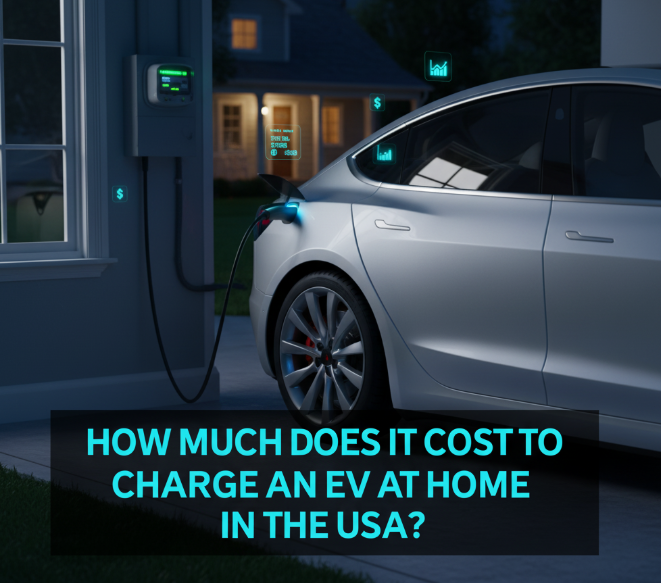Switching to an electric vehicle (EV) is exciting. Not only are EVs better for the environment, but they can also save you money on fuel over time. But here’s the big question many new and future EV owners ask: how much does it cost to charge an EV at home in the USA?
This article breaks it all down in detail — from electricity rates to charging equipment, charging speed, and hidden costs. By the end, you’ll know exactly how to estimate your personal charging expenses and compare them with gasoline costs.
Why More People Are Charging at Home
While public charging stations are popping up everywhere, most EV owners charge at home because:
- It’s cheaper than public charging.
- You can “refuel” overnight while you sleep.
- It’s more convenient — no need to drive to a charging station.
- Home charging keeps your EV topped up daily.
But the actual home charging cost depends on a mix of factors — let’s explore them step by step.
Main Factors That Decide Your Home EV Charging Cost
Several things affect how much you’ll pay every month to charge your EV:
- Your electricity rate (per kWh).
- Your EV’s battery size.
- Your daily or monthly driving distance.
- The charging level (Level 1 vs Level 2).
- Time-of-use electricity plans in your state.
We’ll break down each factor with real examples.
1. Electricity Rates Across the USA
Electricity rates in the U.S. vary a lot depending on where you live. The price is usually measured in cents per kilowatt-hour (kWh).
Here’s a snapshot of average residential electricity prices (2025):
| State | Average Price (per kWh) | Notes |
|---|---|---|
| California | 31¢ | One of the highest in the country |
| Texas | 14¢ | Cheaper due to competitive energy market |
| Florida | 15¢ | Close to the national average |
| New York | 23¢ | Higher in major cities |
| Washington | 11¢ | Among the cheapest |
| National Average | 16¢ | Benchmark for most calculations |
👉 Quick takeaway: Where you live can double or halve your charging cost.
2. EV Battery Sizes and How They Impact Cost
Different EV models have different battery capacities, measured in kilowatt-hours (kWh). A bigger battery = more range, but also higher charging costs.
Examples of popular EV battery sizes:
- Nissan Leaf: 40 kWh
- Tesla Model 3 Standard: 57 kWh
- Ford Mustang Mach-E: 68–91 kWh
- Rivian R1T Truck: 135 kWh
To fully charge these batteries, multiply the battery size by your local electricity rate.
Example (National Average Rate: 16¢/kWh)
- Nissan Leaf (40 kWh) → 40 × $0.16 = $6.40 per full charge
- Tesla Model 3 (57 kWh) → 57 × $0.16 = $9.12 per full charge
- Rivian R1T (135 kWh) → 135 × $0.16 = $21.60 per full charge
3. Cost Per Mile: The Real Comparison
A full charge doesn’t always mean much — what drivers care about is cost per mile.
Most EVs get 3 to 4 miles per kWh of electricity.
At the national average of 16¢/kWh:
- 1 kWh = 3.5 miles (average) → 4.5¢ per mile.
Gasoline Comparison
- Gas car: 30 miles per gallon at $3.70 per gallon → 12.3¢ per mile.
👉 Result: EVs cost about 60–70% less per mile than gas cars.
4. Daily & Monthly Home Charging Costs
Let’s take a real-world example:
- Daily commute: 40 miles
- EV efficiency: 3.5 miles per kWh
- Electricity rate: 16¢ per kWh
Calculation:
- 40 miles ÷ 3.5 = ~11.4 kWh per day.
- 11.4 kWh × $0.16 = $1.82 per day.
- Monthly cost = $1.82 × 30 = $54.60.
Compare that to a gas car (same 40 miles per day):
- 40 ÷ 30 MPG = 1.33 gallons per day.
- 1.33 × $3.70 = $4.92 per day → $148 per month.
✅ Savings: Almost $100 every month just by charging at home!
5. Charging Levels at Home
There are two main ways to charge your EV at home:
Level 1 Charging (Standard Outlet – 120V)
- Uses a normal household outlet.
- Adds 3–5 miles per hour of charging.
- No extra installation cost.
- Best for short daily commutes.
Level 2 Charging (240V Dedicated Charger)
- Requires installing a charging station.
- Adds 20–40 miles per hour of charging.
- Costs $500–$2,000 for equipment + installation.
- More efficient and convenient for most EV owners.
👉 Level 2 chargers don’t reduce the cost per kWh, but they make charging faster and more practical.
6. Time-of-Use Electricity Plans
Many states and utilities offer off-peak charging rates.
For example:
- Peak rate: 25¢/kWh (daytime).
- Off-peak rate: 10¢/kWh (nighttime).
If you charge your EV overnight, you could cut your bill in half.
7. Hidden Costs of Home Charging
When calculating, don’t forget extra costs:
- Home charger installation (one-time): $500–$2,000.
- Electric panel upgrades (if needed): $1,000–$3,000.
- Wiring upgrades for older homes.
- Smart charger apps (optional): $5–$15/month.
These are usually one-time or small recurring costs, but they add to the overall picture.

Real-Life Charging Cost Examples
Let’s look at how much different EVs cost to charge at home monthly (average U.S. driver = 1,000 miles per month).
| EV Model | Efficiency (miles per kWh) | Monthly Electricity Needed | Monthly Cost (16¢/kWh) |
|---|---|---|---|
| Nissan Leaf | 3.8 | ~263 kWh | $42.10 |
| Tesla Model 3 | 4.0 | ~250 kWh | $40.00 |
| Ford Mustang Mach-E | 3.3 | ~303 kWh | $48.50 |
| Rivian R1T | 2.5 | ~400 kWh | $64.00 |
👉 Compare that to a gas car at 30 MPG & $3.70/gal: $123/month for 1,000 miles.
Tips to Lower Your EV Home Charging Bill
Want to save even more? Try these smart strategies:
- Charge at night using off-peak rates.
- Install solar panels to generate your own electricity.
- Use smart charging apps to optimize charging times.
- Avoid charging to 100% daily (saves battery life & money).
- Monitor your utility plan — some providers offer EV discounts.
Solar + EV: The Ultimate Combo
If you live in a sunny state, pairing your EV with home solar panels can almost eliminate charging costs.
- Average solar system: 6 kW generates ~9,000 kWh/year.
- That’s enough for 25,000+ EV miles annually.
- After installation, your EV charging cost = nearly $0.
Infographic: Home EV Charging Cost Breakdown
**(Imagine a pie chart here showing average monthly EV charging cost at $50:
- 80% electricity,
- 15% equipment,
- 5% extras like apps or maintenance.)**
Pros and Cons of Home EV Charging
Pros
- Cheapest way to charge.
- Convenient overnight charging.
- Better for battery health than fast charging.
- Saves hundreds compared to gas.
Cons
- Upfront cost of a Level 2 charger.
- Slower charging if using Level 1.
- Electricity rates vary by state.
- Home wiring upgrades may be needed.
Key Takeaways
- Average U.S. home charging cost = $40–$70 per month for 1,000 miles.
- EVs cost about 60–70% less per mile than gas cars.
- State electricity rates make a huge difference.
- Level 2 chargers add convenience but not extra cost per mile.
- Charging at night or with solar panels can lower costs further.
Final Thoughts
So, how much does it cost to charge an EV at home in the USA? On average, most drivers spend $50–$70 per month, depending on electricity rates and driving habits. That’s far cheaper than gasoline, which often costs $120–$150 per month for the same mileage.
If you add in the convenience of charging while you sleep, the savings from off-peak rates, and the potential of solar energy, home charging isn’t just affordable — it’s the future of personal transportation.
✅ In short: Charging your EV at home in the U.S. is one of the smartest money-saving moves you can make.

